of graduate employers say relevant experience is essential to getting a job with them
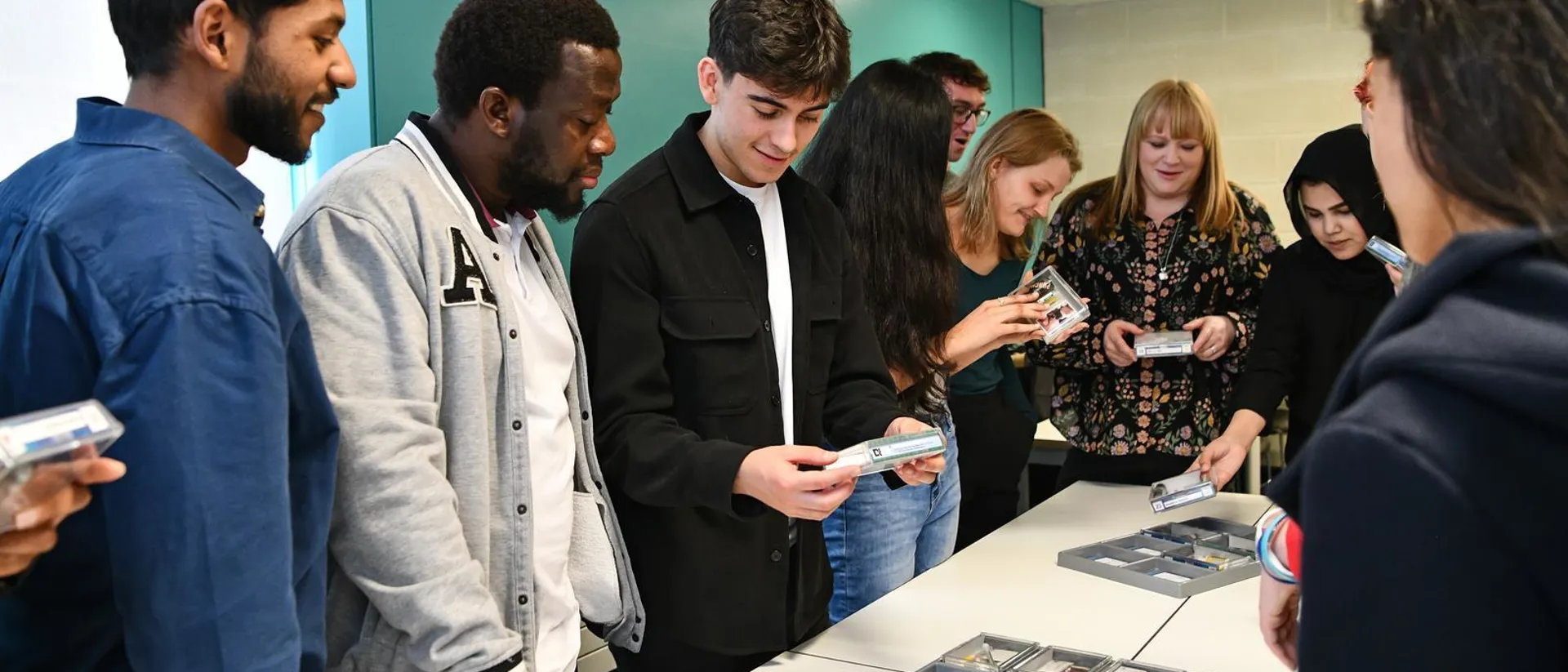
- University
- Undergraduate
- Courses
- Health and Social Care with Foundation Year BSc (Hons)
Award
BSc (Hons)
Duration
4 years full-time
UCAS Code
L55F
Placement
500 hours
Entry
September
Fees
View fees

Skills for Care estimate the sector will need an additional 540,000 posts by 2040

We work with over 1,000 employers to find you the right work placement
Our BSc (Hons) Health and Social Care with Foundation Year leads to rewarding careers, making a meaningful difference to the complex needs of individuals and communities. Our friendly and supportive teaching team are experienced health and social care practitioners, putting us in a unique position to offer specialised optional modules in subjects such as neurodiversity, criminology, and substance misuse. This means you can tailor your studies to suit your particular interests or career goals. Our dedicated employability tutors will support you in completing vocational work placements one day a week throughout your studies, to boost your employability, apply your learning as a practitioner, help you discover your area of passion and give you a real edge as a graduate.
We co-deliver our programme with ‘experts by experience’; those who have used social care services, or their parents and carers. This participatory approach is best practice in the health and social care sector, and as part of your degree, leads you to an authentic understanding of the issues, powerfully boosting your skills, vocational performance and career prospects.
You will have the opportunity to progress on to a wide range of rewarding careers in areas such as family support, community mental health, care management services, alternative education provision, addiction services, domestic violence, housing, social prescribing, disability support and health education. Alternatively, you could progress to master’s level study in areas such as social work, counselling, teaching or psychology. The foundation year offers tailored support and inclusive teaching to build your academic confidence, especially if you're returning to study or come from a non-traditional background.
£5k Cost of Living Allowance
At University College Birmingham, we believe the cost of living shouldn’t hold you back from achieving your goals. That’s why we’re providing UK full-time undergraduate students starting in February or September 2026 with £5,000 each to support expenses like food, bills, and transport - completely free, with no need to pay it back.

Pay early and save up to £4,500
International students applying for our BA/BSc undergraduate degrees, who meet all our deposit deadlines, can qualify for Early Action Scholarships of £4,500 or £3,500, depending on your course. Simply meet the payment deadlines and we'll do the rest - no application needed. International students can also apply for merit scholarships, worth up to the full amount of the tuition fee.
Why should I choose this health and social care degree?
- FOUNDATION YEAR - From level 3 you will explore how to develop essential academic and learning skills, and develop a sense of belonging through teamwork and collaboration. You will identify and practice essential learning and educational skills, enhancing your ability to succeed in higher education.
- NO EXAMS - If you are not keen on exams, this course is for you. Unlike many degrees in this field, you will have no written exams during or at the end of the course and will be assessed through practical assessments and coursework only
- WORK PLACEMENTS – Gain essential, real-world work experience throughout your degree by going on placement one day per week, with opportunities in a huge variety of health and social care settings
- ENRICHMENT – Enhance your CV and professional development with further training and qualifications, including key areas for care workers such as mental health first aid, basic life support, infection prevention and control and autism awareness.
- SPECIALISE YOUR STUDIES – Pick a research topic to study in depth and choose from a wide range of optional modules, including themes such as substance misuse, mental wellbeing and criminology
- AWARD-WINNING UNIVERSITY – Study at the highest-ranking university in the region according to student choice (Whatuni Student Choice Awards 2024)
Our facilities
Students on our health and social care courses have access to our wide variety of learning spaces at University College Birmingham, ensuring you have the right environments to build your knowledge, from lecture theatres to interactive group working spaces and extensive library resources.
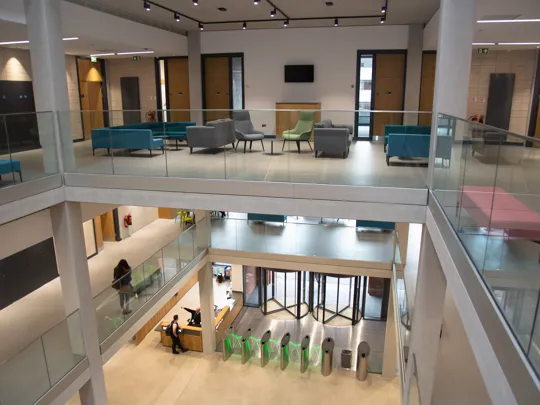
Our new £44 million Moss House campus includes an exhibition space to showcase your work to assessors and prospective employers.
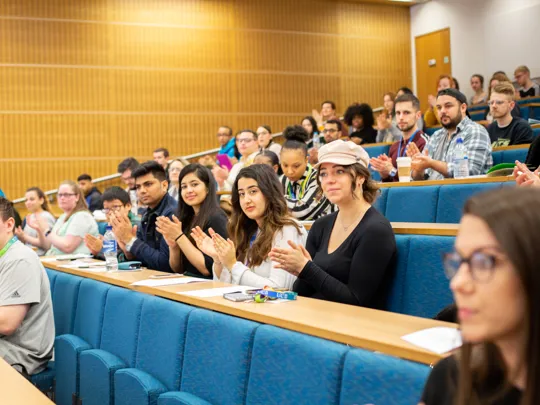
Our campus buildings feature lecture theatres equipped with the latest technology, as well as comfortable tutorial and seminar rooms and private meeting rooms
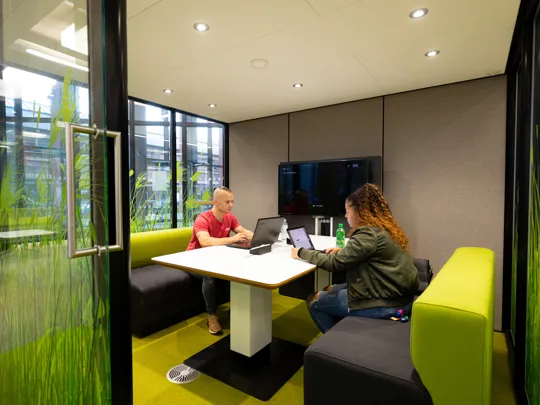
Located in our McIntyre House campus, ThinkSpace features glazed study pods to discuss group projects and glass wipe boards to mind-map your ideas

Our library facilities offer more than 50,000 print resources and over 60 million digital resources, with expert support from qualified library professionals and research specialists
Course breakdown
- Foundation Year
- Year 1
- Year 2
- Year 3
Core modules
Academic and Study Skills for Healthcare
This module is designed to support students in developing the academic and study skills necessary for success in healthcare-related degrees. Focusing on bridging the gap between foundational knowledge and degree-level study, it provides comprehensive support in key areas such as academic English, scientific writing, numeracy, and critical thinking. Students will build confidence in public speaking and self-advocacy while developing essential strategies to overcome systemic barriers in education. This module emphasizes the importance of academic integrity and equips students with the skills to effectively engage with healthcare data, research, and real-world problem-solving. Through interactive sessions students will also learn how to navigate numeracy in health - for example, through measuring and recording vital signs - developing practical experience to support their academic work. Building resilience and the ability to reflect on challenges is a key component of this module, enabling students to navigate setbacks and continue to grow throughout their academic journey.
Health & Wellbeing; Culturally Responsive Healthcare
This module equips you with the knowledge and skills to understand and address the health needs of diverse communities. Focusing on the principles of public health and health promotion, the module explores the social, economic, and environmental factors that influence health outcomes, with particular attention to the public health issues disproportionately affecting ethnic minorities. Key topics include mental health awareness, resilience building, and strategies to reduce stigma around mental health in both society and minority communities. You will also explore cultural perspectives on health and illness, examining how different cultural frameworks shape attitudes toward health and healthcare. The module encourages critical thinking and reflection on how to deliver healthcare that is inclusive, equitable, and culturally responsive. By the end of the module, students will be aware of public health strategies, understand principles of mental health resilience, and what contributes to health disparities, all while considering the cultural nuances that influence healthcare access and outcomes.
Introduction to Healthcare Professions
This module introduces students to the diverse and dynamic world of healthcare professions, with a strong focus on inclusivity, equity, and effective communication. Whether you're considering a career in nursing, physiotherapy, paramedic studies, radiography, or another allied health role, this module will give you the knowledge, confidence, and practical tools to succeed in a modern healthcare environment. You’ll explore what it means to be a healthcare professional—learning about key roles and responsibilities, ethical and legal frameworks, and the importance of working within multi-disciplinary teams. Throughout the module, we’ll shine a spotlight on diverse role models and underrepresented voices in healthcare, helping you see where you fit and how you can make an impact.
The Social Context of Health and Welbeing
Discover how our everyday lives shape our health beyond the medical model. This thought-provoking module dives into the powerful influence of social factors on our physical, mental, and emotional wellbeing. From housing and employment to addiction, neurodiversity, and mental health, you’ll explore how life circumstances can impact individual development and support needs—both now and in the future. You’ll investigate key indicators and risk factors, and gain insight into non-clinical approaches like talking therapies and social prescribing. This module is ideal for students who want to make a real difference by understanding the broader context of health and developing the skills to support people facing complex social challenges. Whether you're aiming for a career in social care, community health, or support work, this module equips you with the knowledge and empathy to approach health and wellbeing from a truly holistic perspective.
Core modules
Academic Skills
Your academic skills and abilities will be developed to enable you to study effectively at an undergraduate level. Key learning concepts will be identified and related to skills relevant to the industry, taking into account the wider education and community focus of your course as a whole. These skills will prove useful in undergraduate and postgraduate level study, as well within the health and social care sector.
Communication for Health and Social Care Professionals
You will develop your skills in effectively building therapeutic relationships, helping and engaging with individuals, adapting to different abilities and preferences, working with individuals and groups, crisis intervention and maintaining boundaries. Teaching and assessment of this module is closely linked to 100 hours vocational placement.
Foundations of Health and Social Care
This module provides you with underpinning knowledge of the role, structure, challenges and opportunities of the sector. It will develop your understanding of complex needs, multi-agency working, service user involvement, assessment, risk management, and care planning and review.
Lifespan Psychology
This module explores psychological theories across the lifespan, and their ethical application within diverse contexts in health and social care. It explores changes in development over the lifespan, and examines how a range of approaches and interventions can be applied to positively support individuals within the health and social care field.
Safeguarding Children and Adults
This module equips students with an in-depth understanding of safeguarding protocols for children, young people, and adults in health and social care environments. By exploring mandatory local and national safeguarding frameworks and guidelines, students will learn to identify signs of abuse, apply safeguarding procedures, and accurately document concerns. Additionally, they will study ethical principles and practices that prioritise the voice of the service user, which is fundamental to making informed decisions.
Sociology of Health
This module introduces you to wide-raging sociological perspectives and contemporary debates relating to the sociology of health, well-being and professional practice. Through enquiry-based learning, you will explore the sociological imagination, the relationship between wider determinants of health and wellbeing, and social inequalities.
Core modules
Advocacy, Co-production and Empowerment
You will develop an understanding of the historical background to advocacy, co-production and empowerment. You will evaluate these principles and develop critical skills to apply them within health and social care settings. You will develop knowledge of a range of relevant policies and legislation, ethical principles and best practices relevant to advocacy, empowerment and co-production.
Developing Research in Health and Social Care
You will develop your own research proposal with careful consideration and justification of proposed methods, analysis and discussion, relevant to a contemporary health and social care issue. You will develop a strong justification for the proposed research and careful consideration of research methods, ethics and appropriate analyses. Students will be able to extend on their introductory research skills at level 4.
Mentoring and Coaching
This module will develop your understanding and skills to enable you to provide effective coaching and mentoring work, either as part of a specific role or within your general health and social care practice. The aims, roles, techniques and challenges of this type of work will all be explored.
Promoting Health and Wellbeing
An introduction to public health will be explored, as well as notions of health, how need is assessed or underpinned, the concepts and techniques of health promotion and education. Practical skills will be developed in how to encourage positive behaviour change using evident and integrated approaches, addressing structural and personal barriers to change.
The Health and Social Care Professional
This module enhances the foundations of your health and social care career through focus on emotional intelligence in the work place, reflective and critical practice, professionalism, and managing yourself and others. It also explores supervision and debriefs, team work and inclusion. Teaching and assessment of this module is closely linked to 200 hours vocational placement.
Optional modules
Managing Acute and Chronic Conditions
This module builds on your understanding of lifespan development, and psychological and sociological influences on health and sickness. It focuses on understanding the pathophysiology of conditions, and the holistic impact this has on the individual, their family, and services. It explores health and social care needs and how management of conditions may change over time from the perspective of the client, their family, and service providers. It will also introduce you to key theories and concepts, in order to structure and form well-reasoned strategies in managing acute and chronic illness.
Substance Misuse
You will develop a realistic awareness and understanding of the use and misuse of all illegal and legal drugs, the numerous treatment options, the social context of recreational and problematic drug use and related theory and policy.
Supporting Individuals and Families
This module will provide students with opportunities to develop their knowledge and understanding of intervention work in supporting individuals and families. It will be particularly helpful for students interested in the provision of 1:1 support for individuals and families using a multi-agency approach. The lectures will explore different family structures, the importance of effective methods of assessment, mediation skills and intervention tools for the promotion of individual and family health and wellbeing.
Core modules
Applying Research in Health and Social Care Practice
You will have the opportunity to deepen your knowledge within a chosen area of the course and the related industry. Using your creativity, problem-solving abilities and data analysis techniques, you will communicate the application, management of research and appraisal of your chosen area, linked to a service improvement, under the supervision of an experienced tutor.
Counselling and Guidance Skills
From informally giving advice and information to a more in-depth addressing of emotional issues, counsellors support others in a wide range of capacities. You will develop an understanding of the use of counselling, its practicalities, the necessity of self-development and boundaries as well as essential skills.
Leadership in Health and Social Care
Studying on this module you will develop your understanding of leadership and management in health and social care settings. You will undertake a range of tasks which will culminate in your creating and presenting a training package to develop new and existing staff in a health and social care context. These activities will develop your skills to become a more effective practitioner, better equipped to lead and manage in the current professional field.
Optional modules
Criminology and Offender Management
This module provides students with an introduction to and overview of criminology and offender rehabilitation, and the core principles of offender management that underpin the offender's journey through the criminal justice system. It also explains interventions to motivate them to stop offending. This will include concepts of offender need, core principles of offender management and the practice of managing different offender groups.
Mental Health
The module will offer you with an in-depth understanding of mental health issues within society. It will explore the unique challenges faced by individuals and examine the cultural, social, and environmental factors that impact mental wellbeing. It will develop and enhance your understanding of policies and practice, in relation to mental wellbeing. The module will provide a balance between theoretical understanding and developing practical strategies.
Neurodiversity
You will develop an understanding of neurodiversity and the range of differences it may bring, using a neurodiversity, strengths-based model. You will develop an understanding of the common challenges faced by neurodiverse individuals, along with the relevant policies and strategies and support needed to promote positive outcomes.
The modules listed above for this course are regularly reviewed to ensure they are up to date and informed by industry as well as the latest teaching methods. On occasion, we may need to make unexpected changes to modules – if this occurs, we will contact all offer holders as soon as possible.
Entry requirements
Health and Social Care with Foundation Year BSc (Hons) [2026/27]
Applicants must meet one of the following:
A-levels: Grade profile of DDD
T-levels: Pass with a core component grade D
BTEC: Extended Diploma or combination of smaller BTECs with an overall grade of PPP
Access to HE Diploma: Minimum 48 UCAS Tariff points, including 45 Level 3 credits at Pass
Other Level 3 Qualifications: Minimum of 48 UCAS Tariff points
GCSEs:
·English Language at grade A-C / 9-4* or equivalent
You must also complete a Disclosure and Barring Service (DBS) check. University College Birmingham will co-ordinate and fund the completion of the DBS check.
International students
For academic and English entry requirements for EU and international students, please visit the Country Specific Information page.
Key information
Teaching and assessment
Note: Indicative information only – actual timetables and assessment regimes will be issued at your induction.
Teaching
Example of a typical teaching week (up to 12 contact hours):
- Large group teaching – 6 hours
- Smaller group teaching – 3 hours
- Tutorials – 3 hours
You will also need to commit around 20 hours per week for individual study time.
Assessment
Estimated breakdown of assessment for this degree course:
- Coursework – 60%
- Practical assessment – 40%
Our teaching and assessment is underpinned by our Learning and Teaching Strategy 2025-2030.
Our programme is mapped to 'The Care Certificate', an agreed set of standards that define the knowledge, skills and behaviours expected of specific job roles in the health and social care sectors, developed jointly by Skills for Care, Health Education England and Skills for Health.
Additional qualifications and training
Throughout your studies, you will have a variety of opportunities to take part in enrichments and additional training, including Mental Health First Aid, Autism Awareness, Basic Life Support, Schwartz Rounds, Infection Prevention and Control, Introduction to the Body Systems, Virtual Dementia Tour, Nutrition and Fluids, and Communication Differences.
Placement
Work placements are vital for gaining real-life experience and for building your confidence and skills before you finish your course – and they may even lead to a job when you graduate. Our Hired team can help find the ideal placement for you.
From your second year, you will undertake a vocational placement one day per week within the health and social care sector. A wide variety of opportunities are available, with our past students having supported children with autism, women with very premature babies, adults with mental illness, projects supporting asylum-seeking families and other health and social care settings.
Tuition fees for home students
If you are a home student enrolling on a bachelor's or foundation degree course at University College Birmingham, the 2025/2026 academic year tuition fee for full-time study is £9,535.
Tuition fees for international students
If you are an international student (or have been fee assessed as an international fee payer) and are enrolling on a full-time [Band 1] bachelor's degree course in 2025/2026, the fee for the academic year will be £16,000.
Kick-Start Scheme
As a new student studying this course full-time, you will receive £300 per year through our Kick-Start Scheme (UK students only, eligibility criteria applies). This scheme will support your studies and future career by contributing to course-related materials, uniform or selected items on campus. You may also qualify for an additional £500 per year.
Find out more about the Kick-Start Scheme here.
Work placements
Work placements are vital for gaining real-life experience and for building your confidence and skills before you finish your course, and they may even lead to a job when you graduate. Our Hired team can help find the ideal placement for you.
Throughout the BSc Health and Social Care course, you will undertake a vocational placement one day per week within the health and social care sector. A wide variety of opportunities are available, with our past students having supported children with autism, women with very premature babies, adults with mental illness, projects supporting asylum-seeking families, and in other health and social care settings.
Work alongside experts in your sector
A snapshot of some of the employers we have worked with:
- Barnardo's
- Birmingham Women's & Children's NHS Foundation Trust
- Anchor Homes
- Heartlands Resource Centre
- Wilson Stuart School

University College Birmingham appealed to me as an international student because of the quality of the course, student support services, modern facilities, and a welcoming and inclusive campus environment.
Nicolas Matovu Health and Social Care BSc (Hons)
Career opportunities
The example roles and salaries below are intended as a guide only.
Family support worker (graduate)
Average Salary: £35,000
Community education officer
Average Salary: £28,000
Learning mentor
Average Salary: £22,500
Health promotion specialist
Average salary: £24,907 – £44,503
Community development worker
Average Salary: £28,500
Advice worker
Average Salary: £28,000

David's Story
With a particular interest in eating disorders and post traumatic stress disorder (PTSD), David has become a skilled healthcare professional and is now taking this even further by studying for an MSc Psychology.
Course statistics
BSc (Hons)
FdSc
Meet your lecturers

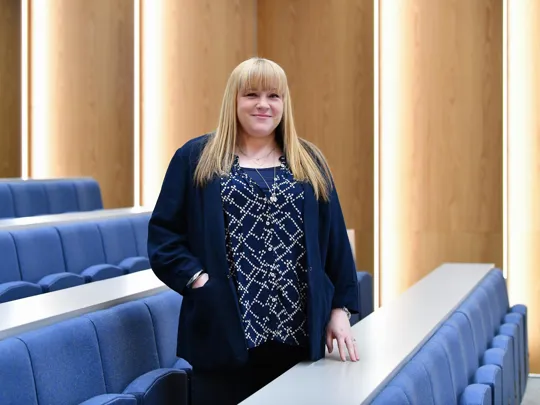
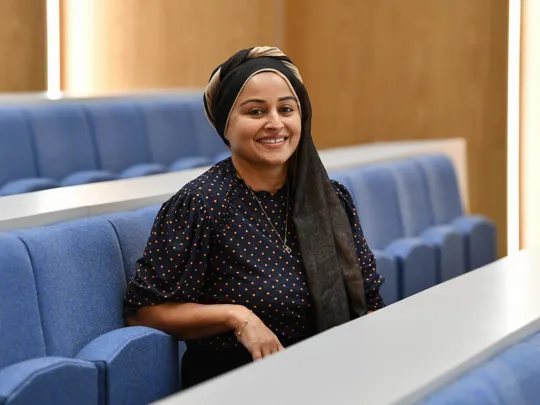
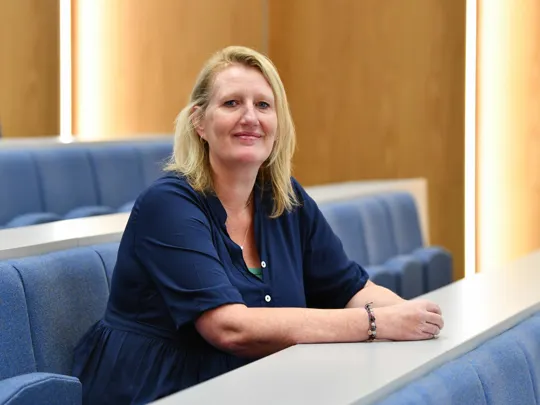
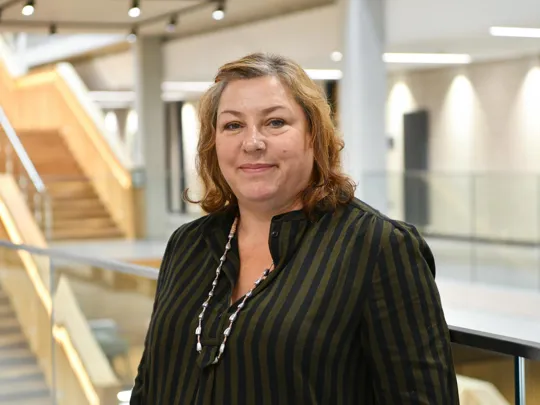

Other courses you may like
Adult Nursing BSc (Hons)
Dream of becoming a nurse? Featuring multiple placements and supported by our outstanding facilities, this award-winning course will prepare you for a rewarding career working in adult nursing, enabling you to become a Registered Nurse with the NMC upon graduation.
Early Childhood Studies BA (Hons)
Working in the early childhood sector allows you to help shape the most formative period of a child’s life. Featuring key industry-recognised standards for graduate practitioners, this course will prepare you for a range of rewarding careers working with young children.
Health and Social Care BSc (Hons) Top-up
‘Top up’ your existing qualifications for a full BSc (Hons) degree on our one-year Health and Social Care course. Improve your knowledge and practical skills to help you launch a career making a difference in the lives of some of the most vulnerable people in society.
